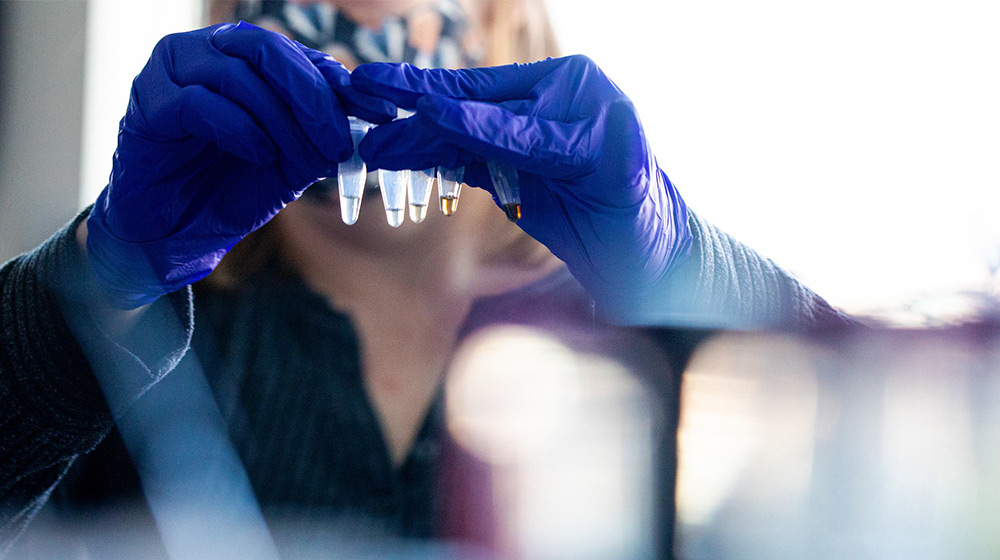About Us
Forensic scientists analyze and evaluate evidence in criminal investigations. This evidence may include DNA from bodily fluids or other cells, drugs in different forms or in bodily fluids, firearms/weapons, and a variety of other types of evidence. A strong background in natural sciences, especially biology, chemistry or anthropology, allows the scientist to apply their knowledge to these analyses. The Forensic Science Program at Loyola University Chicago emphasizes natural science coursework and builds other necessary skills including critical thinking, ethics, strong analytical abilities, and written and oral communication.
Students pursuing the BS in Forensic Science at Loyola University Chicago benefit from expert faculty and state-of-the-art facilities, preparing them for careers in a variety of occupational settings. Apply today!

Program Mission Statement
Provide Loyola University Chicago students with a solid foundation in the natural sciences, educate students in a broad range of forensic analytical techniques from a generalist perspective, educate students in the various aspects of forensic science professional practice, emphasize the importance of critical thinking skills in approaching forensic science problems, and prepare students for entry level positions in forensic science laboratories and graduate or professional schools in the forensic sciences. Specific Program Learning Outcomes (PLO) can be found here.
Advisory Board
In keeping with our mission, the Forensic Science Program has an advisory board made up of administrators from forensic laboratories. The relationships with these laboratories allows the Forensic Science Program to provide our graduates with the most relevant education, skills, and abilities to gain employment. Advisory Board members are regional and national leaders, active within their respective disciplines. Members are from the Illinois State Police Forensic Science Center at Chicago, Northeastern Illinois Regional Crime Laboratory, DuPage County Crime Laboratory, Idaho State Police, US Drug Enforcement Administration-North Central Regional Laboratory, US Internal Revenue Service-National Laboratory, US Food and Drug Administration-Forensic Chemistry Center, and United States Drug Testing Laboratories, Inc.
Updated 04 Oct 2023
Forensic scientists analyze and evaluate evidence in criminal investigations. This evidence may include DNA from bodily fluids or other cells, drugs in different forms or in bodily fluids, firearms/weapons, and a variety of other types of evidence. A strong background in natural sciences, especially biology, chemistry or anthropology, allows the scientist to apply their knowledge to these analyses. The Forensic Science Program at Loyola University Chicago emphasizes natural science coursework and builds other necessary skills including critical thinking, ethics, strong analytical abilities, and written and oral communication.
Students pursuing the BS in Forensic Science at Loyola University Chicago benefit from expert faculty and state-of-the-art facilities, preparing them for careers in a variety of occupational settings. Apply today!

Program Mission Statement
Provide Loyola University Chicago students with a solid foundation in the natural sciences, educate students in a broad range of forensic analytical techniques from a generalist perspective, educate students in the various aspects of forensic science professional practice, emphasize the importance of critical thinking skills in approaching forensic science problems, and prepare students for entry level positions in forensic science laboratories and graduate or professional schools in the forensic sciences. Specific Program Learning Outcomes (PLO) can be found here.
Advisory Board
In keeping with our mission, the Forensic Science Program has an advisory board made up of administrators from forensic laboratories. The relationships with these laboratories allows the Forensic Science Program to provide our graduates with the most relevant education, skills, and abilities to gain employment. Advisory Board members are regional and national leaders, active within their respective disciplines. Members are from the Illinois State Police Forensic Science Center at Chicago, Northeastern Illinois Regional Crime Laboratory, DuPage County Crime Laboratory, Idaho State Police, US Drug Enforcement Administration-North Central Regional Laboratory, US Internal Revenue Service-National Laboratory, US Food and Drug Administration-Forensic Chemistry Center, and United States Drug Testing Laboratories, Inc.
